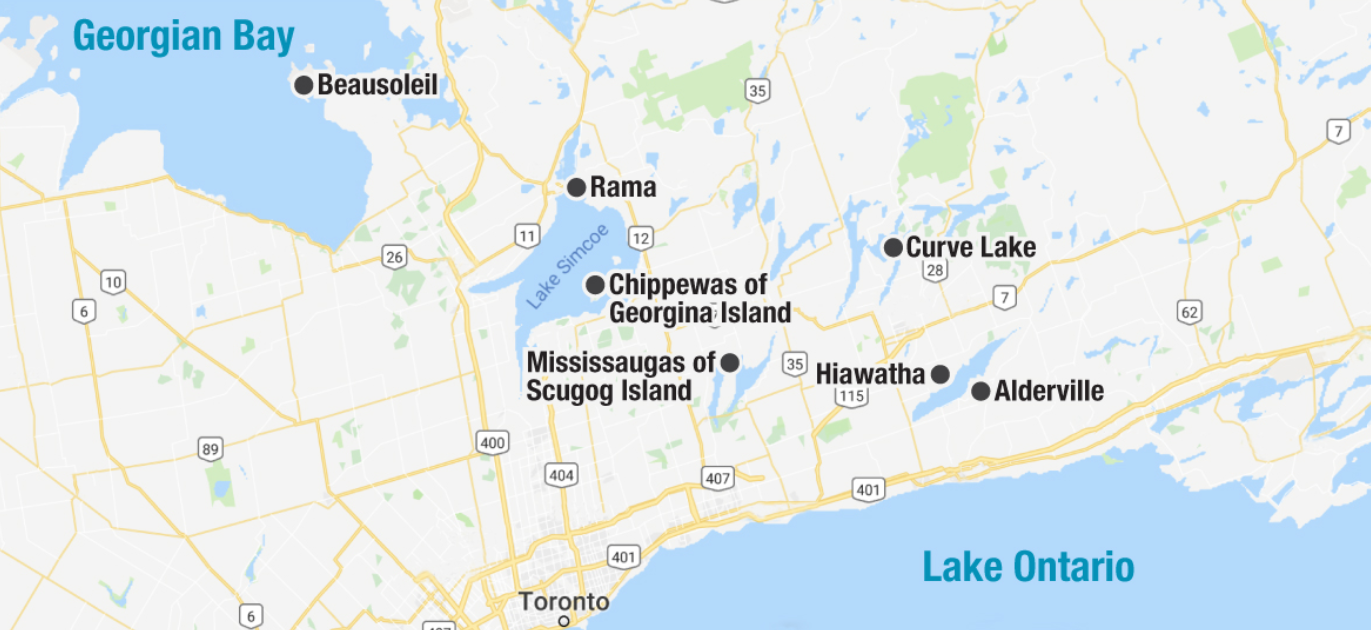Williams Treaties
The land that the Couchiching Conservancy operates on and the land that we protect is on the territory of the Anishinaabeg people. The Anishinaabeg include the Ojibwe, Odawa, and Pottawatomi nations, collectively known as the Three Fires Confederacy. This territory is also home to many diverse First Nations, Inuit and Métis Peoples.
Specifically, our area falls within the Williams Treaties territory. The Williams Treaties were signed on October 31 and November 15, 1923, by seven Anishinaabe First Nations and representatives of the Crown. They included a land purchase and the erasure of all First Nations Signatories right, title, interest, claim, demand and privileges to over 20,000 square km of land.
They were renegotiated and settled in 2018 which includes: Recognition of pre-existing treaty harvesting rights for First Nations members in certain treaty areas; Federal and provincial apologies for negative impacts of the Williams Treaties on First Nations; Financial compensation: $666 million from Canada and $444 million from Ontario; Additional reserve lands: each First Nation can acquire and apply to add up to 11,000 acres to their reserve land base.
The seven Williams Treaties First Nations are:
- Alderville First Nation
- Chippewas of Beausoleil First Nation
- Chippewas of Georgina Island First Nation
- Chippewas of Rama First Nation
- Curve Lake First Nation
- Hiawatha First Nation
- Mississaugas of Scugog Island First Nation

Learn more about the historic Williams Treaties:
- Upper Canada Land Surrenders and the Williams Treaties (1764-1862/1923) – Government of Canada
- Williams Treaties – The Canadian Encyclopedia
- Williams Treaties – Whose Land
- The Williams Treaties – The Great Lakes Research Alliance
- Map of Ontario treaties and reserves – Government of Ontario
Learn more about the 2018 Williams Treaties First Nations Settlement Agreement:
- Canada, Ontario and Williams Treaties First Nations reach negotiated settlement agreement for Alderville Litigation – Government of Canada News Release
- Williams Treaties First Nations Settlement Agreement – Government of Canada
- Statement of Apology for the Impacts of the 1923 Williams Treaties – Government of Canada
- Federal, provincial governments apologize for impacts of Williams Treaties – CBC
- Williams Treaty settlement looks huge in headlines – Maurice Switzer
- COLUMN: Revisiting Williams Treaties 100 years later – Jeff Monague
- 100 years of the Williams Treaties in Ontario: Anishinaabeg perspectives – The Narwhal
Local History and Resources
- Local history – Rama First Nation
- How Lake Couchiching Got Its Name – Rama First Nation
- A history of Chief Island – Rama First Nation
- Mnjikaning Fish Weirs National Historic Site of Canada
- Barrie Area Native Advisory Circle (BANAC)
- Indigenous Initiatives – City of Orillia
- Orillia Native Women’s Group
- Regional Indigenous Organizations
Indigenous Conservation Resources
- Indigenous Protected and Conserved Areas (IPCA) – Conservation Through Reconciliation Partnership
- IPCA Knowledge Basket
- Indigenous Circle of Experts Resources
- For Our Future: Indigenous Resilience Report
- ON Nature Magazine - Indigenous Perspectives on Conservation 2017
- Governance Back: Exploring Indigenous Approaches to Reclaiming Relationships With Land – David Suzuki Foundation
- Indigenous Relations – Ontario Nature
- Indigenous Learning Resources – Ontario Land Trust Alliance
- Report: Respect and Responsibility: Integrating Indigenous Rights and Private Conservation in Canada
- Land Trusts and Indigenous Peoples: The Canadian Context
Indigenous-led Land Trusts and Conservation Organizations in Williams Treaty Territory
Other links and resources
- United Nations Declaration on the Rights of Indigenous Peoples
- Truth and Reconciliation Commission of Canada: 94 Calls to Action
- Missing and Murdered Indigenous Women and Girls (MMIWG) Final Report & Calls to Justice
Anyone experiencing pain or distress as a result of their residential school experience can access this 24-hour, toll-free and confidential National Indian Residential School Crisis Line at 1-866-925-4419.
Indigenous peoples across Canada can also go to The Hope for Wellness Help Line 24 hours a day, 7 days a week for counselling and crisis intervention. Call the toll-free Help Line at 1-855-242-3310 or connect to the online chat.
If you are affected by the issue of missing and murdered Indigenous women, girls and 2SLGBTQI+ people and need immediate emotional assistance, call 1-844-413-6649.

